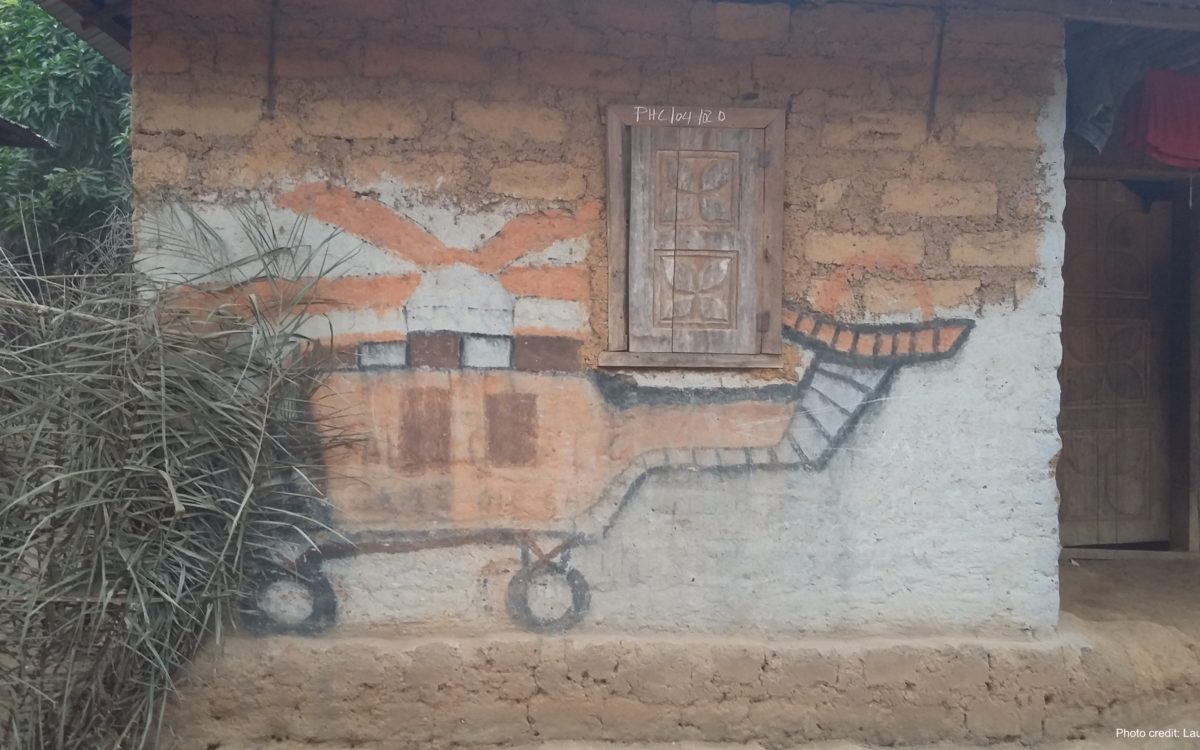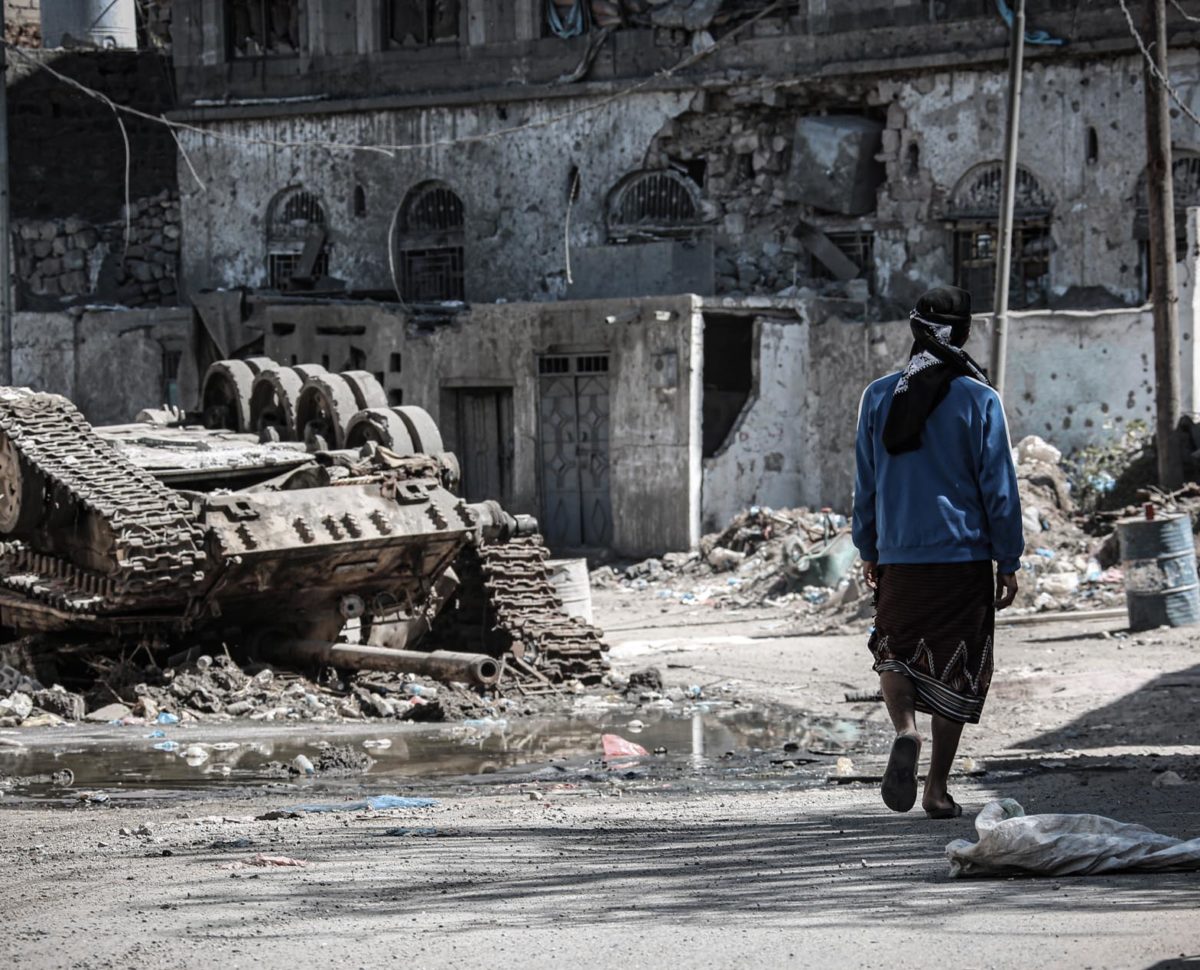
Laura Martin
‘Taking humour seriously can uncover experiences that are frequently too difficult to express otherwise…
My research in Sierra Leone began with war, but was not ultimately defined by it. As with most academics working in the region over the past 25 years, I was drawn to understand how the dynamics of the eleven-year civil conflict (1991-2002) had unfolded and, perhaps more perplexingly, how the country had seemingly re-established a sense of normality in the wake of such extreme violence. Sierra Leone was (and, to some extent, still is) associated with the horrific acts that were committed during this period – namely the consistent targeting of civilians, the conscription of child soldiers (both male and female), sexual and gender-based violence (SGBV), and amputations. Even this past month, as Sierra Leone played in the 2022 African Cup of Nations for the first time in 26 years, a commentator described it as a country ‘ravaged by civil war and Ebola’ (to which I quipped ‘I wonder if England will be described as “ravaged by COVID-19” in the next World Cup’).
And yet, these stomach-churning references starkly contrast to the many other narratives and physical reactions that manifest in times of conflict and violence, namely those of humour and laughter. These are characteristic of the fact that everyday life interweaves itself with conflict from pre- to post-war stages. In addition, humour simultaneously aids in individual and communal transitions, as a form of conversing and recalling traumatic memories.

‘Seriously funny’
Conducting research on conflict and violence is expected to be confined to the ‘serious realm’. As researchers, we are trained to maintain particular ethical and professional standards and abide by certain health and safety protocols, likely more relevant to the researcher’s country of origin than the actual research site. Conducting research with war-related victim-survivors evokes images of intense Q&A’s between researchers and informants, all the while maintaining awareness of whether the questions are too sensitive and reminding participants that they can stop if and when need be (which, as I learned, really makes assumptions about informants from the outset).
While it is absolutely crucial to ensure ‘do no harm’ principles when conducting interviews on sensitive subject matter, what constitutes as ‘sensitive’ really varies. Neither research nor conflict is particularly cut and dry (no pun intended), nor can you necessarily expect people to maintain the serious and severe demeanour we, as researchers, come to expect in researching violence and civil war. In fact, I commonly came across humour and laughter in framing these discussions. Admittedly, it was initially to my surprise that people spoke in such humorous ways about what had always been portrayed as such a violent period. But, as the everyday of conflict unfolded through interviews, it began to make sense.
Findings from Sierra Leone
I conducted interviews in rural parts of Sierra Leone primarily in spring 2014, where, as informants stated, the ‘war did not meet them’ until much later on (in the mid to late 1990s) after rebel forces had been expelled from Freetown. When I interviewed people about their experiences, I invited them tell me as much or as little as they desired: allowing them to lead the interview and highlight what they felt was important to share. This, at times, skimmed over the ‘violent invasion’ of the community in favour of highlighting more mundane elements that had personally impacted them. For example, an imam I interviewed really focused on the fact that his bread oven had been destroyed and this was something he had never fully moved past. The oven came up again and again throughout the interview. And, by comparison to some of the other extremely violent accounts I had heard, this incongruity struck me as somewhat humorous. But to the imam, it really stood out as the symbol of loss.
In other instances, people made jokes about cutlasses or machetes, weapons that were sometimes used against civilian populations. They joked about people being captured and escaping, the attacks on towns, soldiers – virtually all elements that make up a ‘war’ were also the butt of jokes. As one informant stated: ‘people don’t discuss war in serious ways anymore. It is really just part of jokes. For example, if someone is coming with a gun (for hunting), someone may pretend to be a rebel and say “if you don’t take [the gun], I’ll kill you” and he laughed. Many others made similar observations; as another man stated ‘while working and drinking poyo (palm wine), we will joke about the war now. It’s an escape mechanism’.
Even during my last visit to Sierra Leone, I went to meet a colleague about something entirely unrelated to the civil conflict and we ended up having a discussion about it. He began laughing and said he had had a funny encounter with rebels, wherein he had been captured as a schoolboy. He portrayed himself as very scared and upset, by contrast to the more hardened, masculine rebels. He began to laugh and said that once the rebels learned he could read and write, they said they would release him because the rebels wanted to show they supported education and so they asked him to write a letter to demonstrate his skills, and then let him go and told him to say in school. We both laughed for some time at the ironies implied in this story.
Further, while interviewing a comedian during my last trip, I also asked him about the conflict, and he said there used to be all kinds of jokes that circulated – both ‘formally’ and in everyday life. One that has been circulated goes: ‘the rebels attacked a town and one gentleman from the village hid behind the grave. So, the rebels were searching and found the man and asked, “what are you doing there?” The man responded, “I died last year, I just came to see how the area is, whether things are cool”’. As he pointed out, in a country where crisis is so often part of life – the rebel war, the Ebola epidemic, a serious mudslide, and now COVID-19 – these jokes help to ease tension.
Humour and the processes of conflict
There are a few things that humour can tell us both about the conflict and how people think about their experiences now. First, as various respondents pointed out, it is a way to ease tension and calmly discuss what was for some a very difficult period (although for others, the Ebola epidemic proved more difficult). Humour is a way of re-framing memories and speaking about difficult experiences. Second, when I inquired with people in communities about whether the war is still discussed, the vast majority said that it was most frequently brought up through jokes, for example while farming or drinking with friends. This also signals a sense of reconciliation amongst Sierra Leoneans – that they have come to terms with these experiences, in some form or another and that humour did relevant and critical social work in aiding this transition between war and post-war mindsets.
The culmination of these elements illustrates how humour can be understood as a lens for examining violent events in the past and present; to this end, it can also be employed methodologically, in relation to civil war research. Interviews about wartime experiences are ultimately personal stories, and stories are frequently intertwined with humour. So, in many ways, it should not be surprising that people integrate these anecdotes from pre- to post-war stages. These accounts of both the serious and the humorous are also aptly reflective of conflict itself – as most people do not experience constant (or even frequent) violence during these periods. In many instances, the experience of conflict is one of everyday life infused with uncertainty; but this does not require elimination of positive experiences and emotions (resultant of humorous exchanges) that ebb and flow during such periods.
Humour, therefore, should not be dismissed as ‘outside the research realm’ because it is not serious. Taking humour seriously can uncover experiences that are frequently too difficult to express otherwise. Humour is a means of framing difficult experiences, in what myself and co-authors have referred to elsewhere as productive incongruity. Neither jokes nor ‘serious accounts’ should necessarily be privileged, but they need to be understood as relational and in tandem with one another. Humour does not signal an absence of academic rigour, particularly in the context of violence and civil war; on the contrary, it provides a wealth of insights that are ‘seriously funny’.
If you want to read further on the use of humour in conflict/violent settings, Laura recommends David Brandenberger’s edited volume Political Humour Under Stalin: An Anthology of Jokes and Anecdotes, and the volume co-edited by Sabine Damir-Geilsdorf and Stephan Milich, Creative Resistance: Political Humour in the Arab Uprisings.

